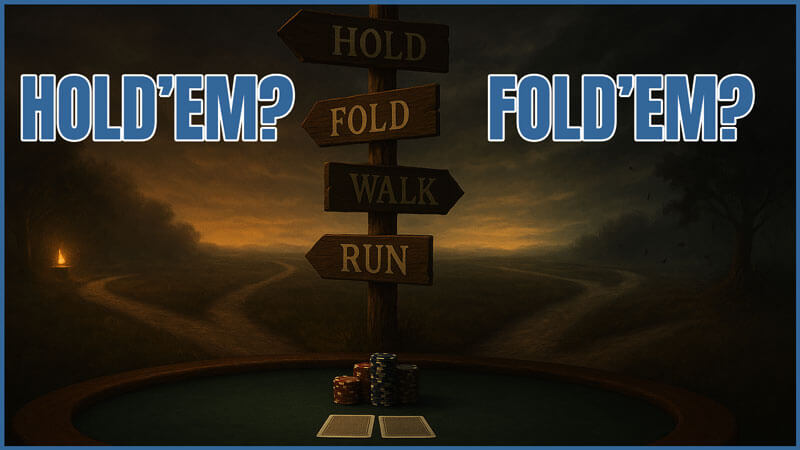Know When to Holdem and Know When to Foldem
There’s an old Kenny Rogers song about gambling that goes, “You gotta know when to hold ‘em, know when to fold ‘em, know when to walk away, know when to run…”
The last two phrases about walking or running away are of vital importance in playing poker.
Knowing When its Time to Stop
You have to know when to leave a poker game, because if you’re keen, and sincere about winning, you’re focusing energy and emotion on the game, and that level of intensity and tension cannot be maintained for very long. You might be playing at your highest level at one point, but what happens when you start sliding down?
It’s essential to develop a feel for the right time to leave the game, based on your own performance and mindset, rather than how recent hands have gone.
Being able to recognise when to leave the game is a hallmark of experienced players. It takes time and self-awareness, and it’s something even seasoned players continue to improve on.
Undoubtedly this is a skill best acquired over time and by playing many games of poker, but most of all you need to understand yourself and recognise the signs.
If you know your own game of poker well enough and can assess your situation at any point, you’ll be in a better position to manage your play responsibly. Understanding your strengths and limitations is a key part of long-term success and protecting your bankroll.
Don’t Set Limits
Quitting is a fine art. It’s not a good idea to quit just because you’ve run out of money or because everyone else has left the table! You need to have a valid reason to quit because it suits you.
Time pressures are never good either, if you know you’ve got nothing to do for a few hours, it doesn’t mean you should continue to play poker if you are not performing well. Basically you’re not just deciding to play poker for the next few hours — you’re risking more money during that time. If your performance is slipping, it’s usually smarter to take a break and reset.
If you’re playing well and winning, there’s nothing wrong with staying in the game and making the most of your momentum — that’s smart poker. Just be sure to keep your emotions in check and stick to your bankroll plan so you stay in control while you’re ahead.
Even if you’re currently losing, playing well is still a positive sign. Just be sure to stay self-aware — if you’re making the right decisions, it might make sense to continue, but only if you’re also staying within your limits.
The Signs it’s time to Quit
There are various signs that indicate it’s time to leave the game, most of these will be personal to you, but here are just a few as an example:
- When your making lots of mistakes that you know you don’t normally make.
- If you’ve just taken a big loss and it’s affecting you emotionally, it’s usually best to step away. Playing while upset often leads to poor decisions and further losses.
- Feeling fresh and alert gives you the best chance of making good decisions. Fatigue can reduce your patience and focus, both of which are key to strong play.
When you play, your performance will be enhanced if you are physiologically and psychologically fit. Breaks refresh you and bring you back to the game with new energy.
Try to develop your own techniques for quitting at the right time — leaving a game when it suits you can help you protect your bankroll and play more consistently over time. Good luck with your quitting!
